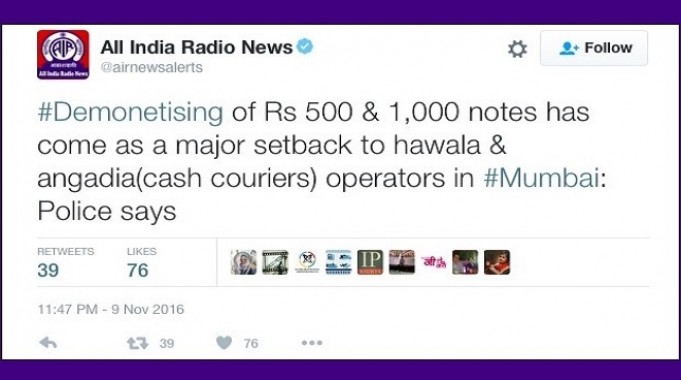AIR: The Master’s Voice during the cash crisis
What a pity that All India Radio (AIR) instead of giving space to a diversity of well-argued viewpoints on demonetization and helping to form sound public opinion based on facts rather than rumour, chose the easy option: trumpet news and views which support the government. Ordinary people in long queues are suffering? Never mind, said AIR; there is no gain without pain. There are critics of the policy? Never mind, said AIR; their views don’t count.
The speeches and quotes of ruling party politicians were repeated much too frequently. On November 14, when the problems relating to the short-term impact were becoming more obvious, I listened to 15 news bulletins in Hindi and English, starting at 5 a.m. and continuing almost till midnight, and 14 started with the four words ‘ Pradhan Mantri Narendra Modi ’ or ‘ Prime Minister Narendra Modi’.
The news bulletins were all about the Prime Minister’s statements and those of other prominent leaders. The problems of ordinary workers were ignored or understated or were mentioned only in the context that some short-term pain will have to be accepted as the unavoidable price of long term gains. The various experts who were called in to substantiate this claim were high on rhetoric but short on reasoned arguments to prove that significant gains are possible.
The overall tone of the coverage was congratulatory. The anchors appeared to be equally eager to maintain this trend. In one programme on November 19 on FM Gold, when the expert, Dr. Yamini Aggarwal, was extending her congratulations, the anchor went a step further and asked: ”Do you think we should have a demonetization every five years?”
On the other hand, in another interview, this time with State Bank of India head Arundhati Bhattacharya, the anchor was well prepared to ask meaningful questions and the expert also articulated her supportive opinion rather well. This was an example of a programme in support of demonetization which moved the debate along, unlike others which could not go beyond rhetoric.
‘’Public Speak’’ is a well-structured programme on Monday nights where experts take questions from listeners. It is best when the questions and answers remain short and crisp. But the Union Minister Santosh Gangwar who had been brought in as the main expert insisted on dominating the show with his rhetoric instead of answering the public’s questions while the anchor appeared helpless to check him.
As an avid listener of AIR news and views, despite its frequent pro-government, pro-establishment bias, I have valued the range of news it gives me - various states, regions and cities all covered in the news bulletins. Likewise, I find AIR current affairs programmes useful and have often been a regular participant for several years.
However, as a friend of AIR, I have been increasingly troubled by the steadily diminishing space for points of view which are contrary to that of the government. Of course, this space was never as big as it should be, but it was there. For some time, though, I have had the sinking feeling that this space is being eroded gradually but in the days following demonetization, this process seemed to accelerate.
AIR chose to consistently downplay the hardships of the ordinary citizens wasting hours - days perhaps – in queues with no money for food. While several newspapers have regularly reported deaths caused by the crisis, these deaths have received minimal attention. Nor has AIR given space to the views of opposition leaders.
Its eagerness to praise demonetization even spilled over into music programmes. In one such programme on FM Gold, an expert and the anchor kept congratulating the government and dwelling on the duty of all citizens to support the move. Their conversation went something like this:
“Well the weather is nice these days and so people won’t really be unhappy standing in queues…Actually this getting together is also good for social interaction. It is so much a part of our culture… This is one good aspect of our national life….we get together when there is real need…It is our patriotic duty to support this action against terrorism…One worrying thing though is why those standing in queues lack discipline…The poor policemen have to face so much difficulty controlling them…”
There has also been a spurt in advertisements backing demonetization. In technical terms, these are well-made ads, but there is a serious problem with the content which essentially says that honest persons support it, implying that the opposition is dishonest. This offensive approach which seeks to either stifle divergent views or mocks them before listening to them is not at all democratic.
AIR should act to maintain its democratic character and prevent further loss of credibility. It is certainly within its mandate to broadcast well-reasoned views in support of demonetization but on this, and other important issues, it should also provide reasonable space to opposing viewpoints.
Bharat Dogra is an independent journalist who has participated frequently in AIR’s news programmes in recent years.
